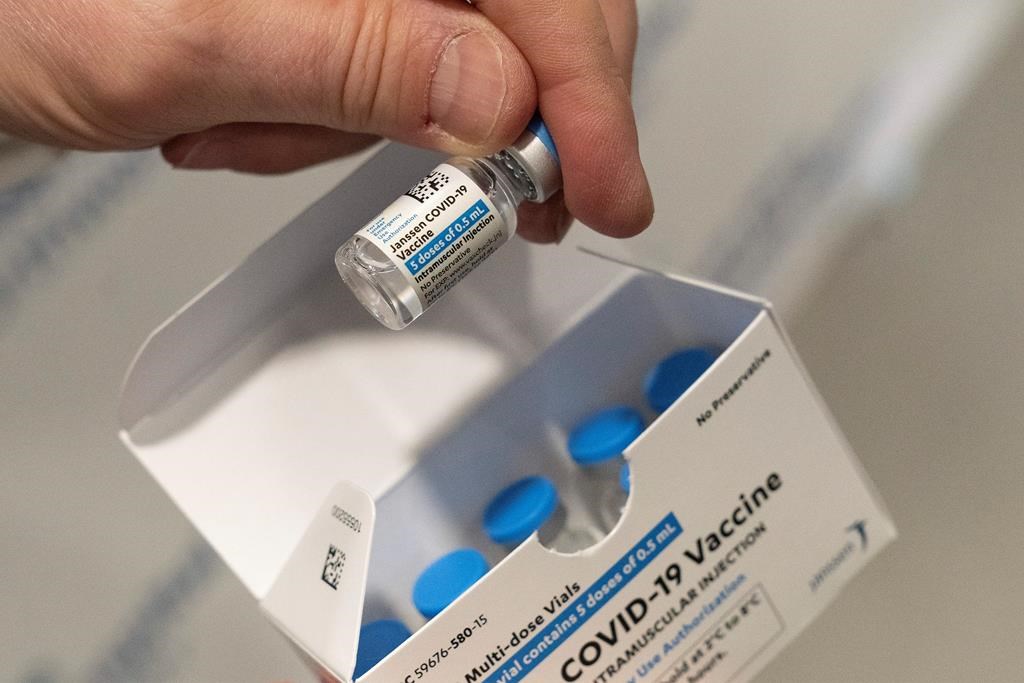OTTAWA — The federal government says it expects Canada to receive around 1.9 million doses of COVID-19 vaccine this week, including its very first shipment of single-dose shots from Johnson & Johnson.
Canada is set to receive about 300,000 doses of the J&J vaccine, which will come in addition to more than 1 million Pfizer-BioNTech shots and around 650,000 jabs from Moderna.
The country is not currently scheduled to receive additional supplies of the Oxford-AstraZeneca vaccine, which has been in heavy demand after the eligible age for the shot was dropped to 40-plus in several provinces.
That demand is only expected to increase after the National Advisory Committee on Immunization adjusted its age recommendation for the shots, announcing on Friday that Canadians 30 and older should get the AstraZeneca vaccine.
Some provinces, however, have said they don’t have enough supply to expand eligibility any further.
Federal Public Procurement Minister Anita Anand said last week the government is in talks with the United States to secure additional AstraZeneca doses after President Joe Biden suggested his country might share the shots with Canada.
The U.S. has stockpiled tens of millions of AstraZeneca shots, but health officials there have not approved the vaccine for use.
Anand said earlier this month that Canada still expects to receive 4.1 million doses of AstraZeneca from all sources by the end of June.
The expected arrival of the first Johnson & Johnson doses later in the week follows the end of an 11-day pause in the U.S. as health officials looked into six cases of rare blood clots.
There have also been questions and concerns about possible contamination of AstraZeneca and Johnson & Johnson doses at a Baltimore factory.
Health Canada released a statement on Sunday offering assurances that the two vaccines are safe.
“Health Canada has verified that the 1.5 million doses of AstraZeneca vaccine imported into Canada from this facility meet quality specifications,” it said.
“The department reviewed test results of all vaccine lots that came into Canada, as well as the company’s quality control steps implemented throughout the manufacturing process to mitigate potential risks of contamination.”
The Johnson & Johnson vaccines expected this week do not come from the Baltimore facility, it added.
This week will also mark the last in which Canada will receive less than 2 million doses of the Pfizer-BioNTech vaccine, as the pharmaceutical giants prepare to ramp up deliveries for the foreseeable future.
The government expects the Pfizer-BioNTech shots to arrive early in the week, and the Moderna doses around mid-week.
Provinces reported 231,540 new vaccinations administered over the past 24 hours on Sunday, for a total of 12,044,741 doses given since the start of the vaccination campaign in the winter.
Across the country, 1,018,381 people, or 2.7 per cent of the population, had been fully vaccinated. The provinces have administered doses at a rate of 31,780.926 per 100,000.
This report by The Canadian Press was first published April 26, 2021.
Lee Berthiaume, The Canadian Press
Montreal officials are looking into extending voting rights to more than 100,000 non-citizens in order to better integrate immigrants and encourage more racialized people to participate in municipal politics.
The idea isn’t new: for years, Canadian cities such as Toronto, Vancouver and Saint John, N.B., have debated or proposed giving the vote to permanent residents — but none have succeeded in convincing provincial or federal governments to modify citizenship and voting laws.
Montreal can “show leadership” on this issue and rekindle the debate in the country, according to an April 19 report by the city’s committee on social development and diversity.
“Granting voting rights to permanent residents is one of the ways to foster political participation and ensure better representation of the various groups that form society,” the report said.
“Montreal, the city that welcomes the largest number of immigrants to Quebec each year, should ensure it reflects the diversity of its population.”
The committee, composed mostly of elected officials from the two main parties at city hall, wants Montreal to publicly affirm its desire to grant voting rights to permanent residents who have lived “for at least 12 months on the territory of the city of Montreal.” It also wants the city to lobby the provincial and federal governments to change laws to allow non-citizens to vote in municipal elections.
The idea has its critics. Frederic Bastien, history teacher at Montreal’s Dawson College and former leadership candidate for the Parti Quebecois, says allowing non-citizens to vote could endanger the foundations of the nation state.
He says citizenship comes with an understanding of the culture, language and history of a country, adding that the idea could be a political strategy by Mayor Valerie Plante ahead of next November’s municipal election.
“It is part of a series of gestures from the Plante administration,” Bastien said in a recent interview. “It’s a ‘woke’ trend among Projet Montreal and it’s a toxic vision of social and public life,” he added, referring to Plante’s political party.
Chris Erl, doctoral candidate in McGill University’s geography department who researches municipal politics, disagrees that granting voting rights to marginalized communities would undermine the country’s democratic values. Rather, he said, doing so would provide a voice for many people who have been excluded from politics.
“Where all the political parties have failed in the past is in recruiting candidates from communities of colour,” Erl said. “Something like this could certainly help inspire people that may feel isolated from the political system to get involved.”
He said he questions the fairness of refusing to allow people who are actively engaged in the urban life of a city the right to select those who represent them in office.
“People need to look at this from the very basic idea that their neighbours, who might not have citizenship, are paying the same property taxes, they use the same services and they have the same ideas and opinions about how the city could be better run, so why shouldn’t they be able to send people to city hall to make decisions?” Erl said.
The city’s diversity committee noted that permanent residents compose about 9 per cent of Montreal’s population, equalling about 170,000 people — roughly 105,000 of whom would qualify as voters.
Montreal’s city administration says it’s interested in letting non-citizens vote in order to attract more people to the political process — especially immigrants. Voter turnout in the 2017 municipal election was 22 per cent in Cote-des-Neiges—Notre-Dame-de-Grace, the most ethnically diverse borough in the city, according to government data.
But it’s unclear what the Quebec and federal governments think of Montreal’s idea. A spokesperson for Quebec’s municipal affairs minister didn’t return a request for comment. And Corinne Havard, spokesperson for federal Intergovernmental Affairs Minister Dominic LeBlanc, said Ottawa doesn’t play a role in municipal elections and directed questions about reforming voting laws to the Quebec government.
Montreal doesn’t seem interested in pushing the issue at the moment — at least not ahead of November’s city election.
Genevieve Jutras, spokeswoman for Plante, said the city will take its time to examine the report, adding that it is up to the provincial government to modify voting rights.
“The administration doesn’t have the intention to request a modification before the next municipal election,” Jutras said.
This report by The Canadian Press was first published on April 26, 2021.
Virginie Ann, The Canadian Press
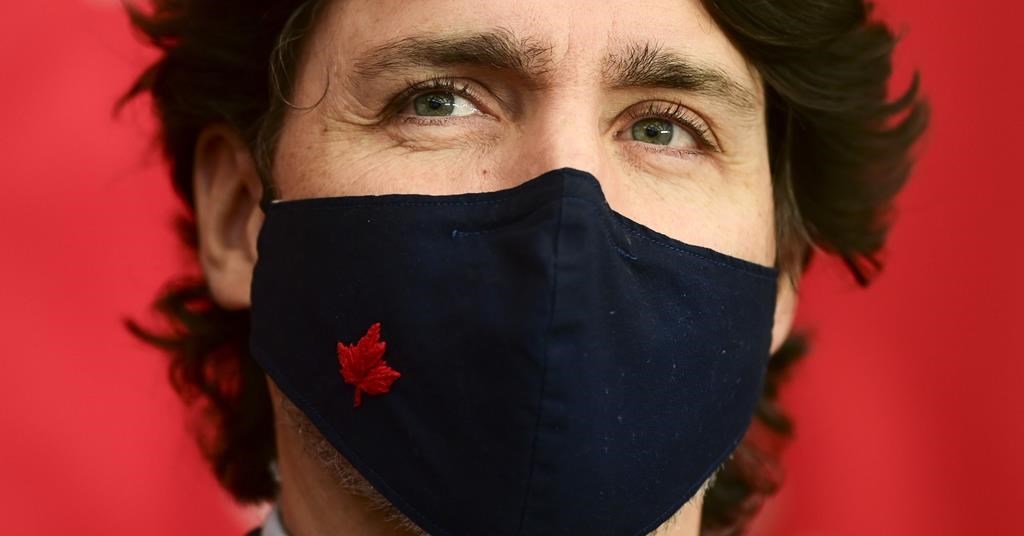
Prime Minister Justin Trudeau will be receiving a COVID-19 vaccination on Friday after the eligibility for the AstraZeneca vaccine was lowered to 40 years of age and older in Ontario.
Trudeau shared the news in a tweet in which he said his wife, Sophie Gregoire-Trudeau would also be getting the shot.
DP leader Jagmeet Singh has already received his jab and Conservative leader Erin O’Toole is set to get his COVID-19 vaccine this weekend.
Ontario lowered the eligibility of the AstraZeneca COVID-19 vaccine from 55 years old to 40 and appointments became available on Tuesday. Over 1,400 pharmacies are currently offering the vaccine.
Premier Doug Ford and Toronto Mayor John Tory also both publicly received their first dose of the AstraZeneca COVID-19 vaccine in a pharmacy.
The province has administered 4,266,802 vaccine doses so far and 351,354 residents have been fully vaccinated.

Premier Doug Ford has apologized for the heavy handed pandemic measures introduced last week, while also promising to bring in a paid sick-leave program.
“We got it wrong, we made a mistake… I’m sorry and I sincerely apologize,” Ford said while speaking outside his home where he is currently quarantining after a member of his staff recently tested positive for COVID-19.
“I will always try to do what’s right,” Ford said. “If we get something wrong, we’ll fix it.”
An emotional Ford also said they are working on a paid sick day program – something that his government has resisted since the pandemic began.
He says people forced into quarantine should not have to worry about their jobs or income.
He says the province is now working on a solution because the federal government hasn’t expanded its own policy but did not go into details or provide a timeline. In a statement released later in the day, Ford says they will not mandate Ontario companies to provide sick days.
“While we work to fill the gaps in the federal paid sick leave program, Premier Ford made very clear today that our government will not impose any additional burden on the backs of Ontario businesses that have been ravaged by the COVID-19 pandemic,” Ford’s press secretary said.
Critics slammed Ford for failing to make substantial commitments to immediately implement sick leave and noted he also didn’t move to follow other recommendations from experts like closing all non-essential workplaces.
NDP Leader Andrea Horwath quickly responded following Ford’s virtual press conference, saying the Premier “chose to walk people into a catastrophic third wave,” adding that his comments offered nothing.
“No more delays and disastrous decisions that cost lives. Ford must pass paid sick days, close non-essential businesses, and send vaccines to hotspots. Today,” Horwath said.
“Entire families are lying in the ICU. Folks go to work with symptoms because they can’t afford a sick day. Vulnerable people and our frontline heroes cannot get a vaccine. Every day Ford delays action, more lives are lost, and more families and businesses are devastated.”
Liberal Leader Steven Del Duca, who recently issued a statement urging Ford to step down, said Ontarians are losing confidence in the Premier’s ability to lead the province through the current circumstances.
“Doug Ford knows he’s spiralling and that Ontario voters have lost confidence in his ability to manage this emergency. But ‘Sorry, folks’ won’t cut it,” said Del Duca.
“His cold-hearted refusal to introduce paid sick days for more than a year has already cost lives.”
Asked if he still has the moral authority to lead Ontario, Ford said “I’m not one to walk away from anything, we will continue to lead through this pandemic.”
The union representing public employees also criticized the sick leave announcement as lacking action, saying it left workers hanging.
“It’s time for far more than assurance that he’ll work on something,” Fred Hahn, president of the Canadian Union of Public Employees Ontario said in a statement.
In his morning press conference, Ford did acknowledge that the lockdowns have been “devastating for people.”
“I hear it everyday – every single day. People telling me their stories, the stories that make you cry. Families that haven’t been able to hold hands…,” Ford said as he became emotional, his voice quivering. “Hold the hand of their mum or dad as they passed away because of COVID-19 restrictions in hospitals.”
The turnaround came after Ford announced new COVID-19 regulations on Friday that gave police sweeping new powers and closed playgrounds and other recreational facilities, sparking a furious backlash from law enforcement, municipal leaders and medical professionals.
The government announced the new restrictions amid soaring cases and an alarming rise in COVID-19 hospitalizations.

Pregnant women will soon be able to receive a COVID-19 vaccine as the province plans to move pregnancy from the at-risk category of health conditions to the highest risk category for vaccine eligibility, a source has confirmed to 680 NEWS.
The change will be effective April 23. The majority of health units are offering vaccinations to those in the highest risk and high risk categories.
A Twitter post from Chatham-Kent’s Public Health Unit also said the province had moved pregnancy to the highest risk category for health conditions identified in Phase 2 and encouraged pregnant woman to book their appointment.
Pregnancy was originally announced as part of the third tier of health condition or the “at-risk” category with vaccine eligibility estimated to be in mid-May.

One of the largest reports on COVID-19 vaccination in pregnancy was published Wednesday by researchers at the U.S. Centers for Disease Control and Prevention and bolstered evidence that it is safe, although the authors did say more comprehensive research is needed.
The preliminary results are based on reports from over 35,000 U.S. women who received either the Moderna or Pfizer shots while pregnant.
Their rates of miscarriage, premature births and other complications were comparable to those observed in published reports on pregnant women before the pandemic.
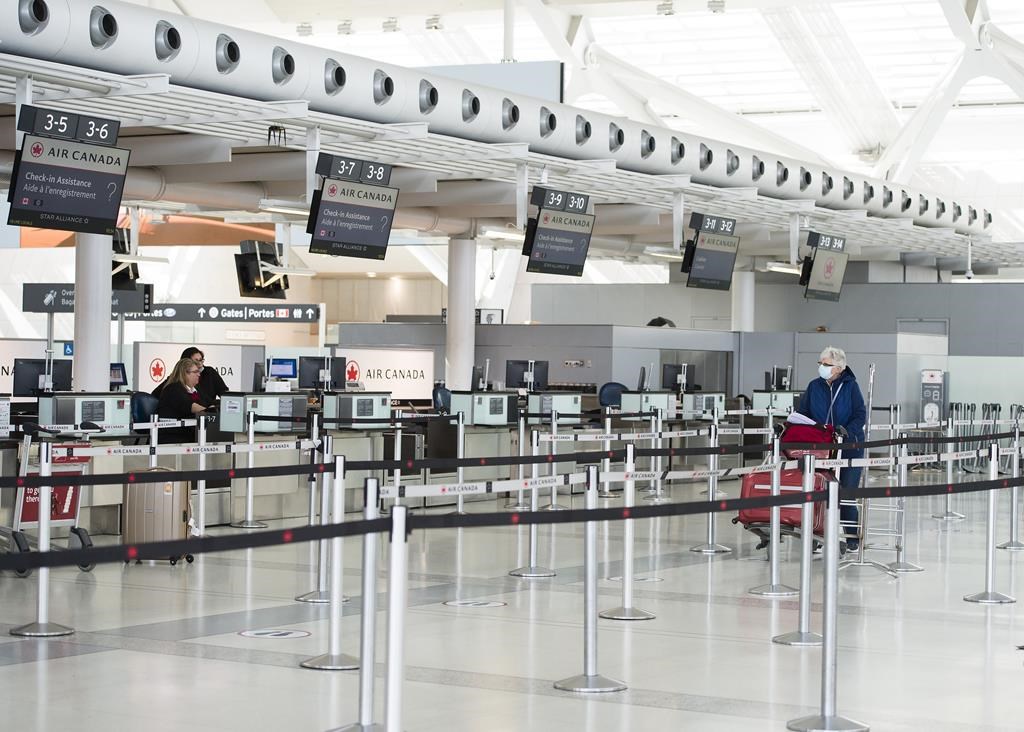
The federal government is suspending incoming passenger flights from India and Pakistan for the next month as cases of COVID-19 surge in both countries.
“Effective 11:30 p.m. Eastern time tonight, I am suspending all commercial and private passenger flights arriving in Canada from India and Pakistan for 30 days,” Transport Minister Omar Alghabra said Thursday.
“Cargo flights will be allowed to ensure the continued supply of vaccines, PPE and other essential goods. This is a temporary measure while we assess the evolving situation and determine appropriate measures going forward.”
To discourage people from getting around the flight ban by booking flights through other countries, Canada will require passengers transiting through a third nation to go through customs in that country and remain there until they obtain another negative COVID-19 test. Only then can they board their flight to Canada. They will be required to quarantine in Canada as well.
“Those are the measures that are actually effective in not just eliminating direct flights and the risk that might represent from hot-spot countries but also by taking the steps that are necessary to ensure that we don’t allow people using connecting flights,” said Public Safety Minister Bill Blair.
The rules apply to Canadian citizens and foreign nationals.
All passengers arriving in Canada by land or air from any country have to show a negative COVID-19 test and quarantine for two weeks, with some exceptions for essential workers. Air passengers must quarantine for the first three days at an approved hotel awaiting a COVID-19 test result, and must test again 10 days after arriving.
About 300 people have been fined $3,000 each for refusing to quarantine in an approved hotel upon arrival.
Health Canada has said about one per cent of all hotel quarantine passengers test positive for COVID-19.
Health Minister Patty Hajdu said half of the people who are testing positive for COVID-19 after arriving in Canada on an airplane came from India, even though Indian flights accounted for only one-fifth of air traffic.
She said passengers coming from Pakistan are also testing positive at higher rates than average.
British Columbia’s provincial health officer said it’s a difficult time for not just people in India but those living here who have family and friends in that part of the world.
“We hope that they will be able to get control of this wave in that country,” Dr. Bonnie Henry said.
B.C. health officials are “very supportive” of the federal government temporarily stopping flights coming into Canada from India and Pakistan, she said.
“We’ve seen this when we had increased rates in the U.K., where we needed to take a break and ensure that we had an understanding of what was going on.”
Canada is struggling with a third wave, so anything that can be done to stop further introductions is welcome, especially since officials have noticed “challenges” with the quarantine program for international travel, Henry said.
Health Canada data show 112 flights landing in Canada since April 7 have carried at least one passenger who later tested positive for COVID-19, including 32 from Delhi and two from Lahore, Pakistan.
There were also 10 such flights from France, 20 from multiple cities in the United States, and 10 from the United Arab Emirates.
India is seeing the biggest surge of COVID-19 to date, with more than 314,000 new cases reported Thursday, its highest one-day total ever.
Ruby Dhami, a travel agent in Surrey, B.C., said families of those who had travelled to India and planned to return in the coming days have been calling to ask how their loved ones could get home.
“We don’t have any answers on that,” she said, adding about 80 per cent of people who went to India live in Canada as permanent residents on a work or student permit.
“With a lot of COVID cases coming up a lot of their family or friends have passed away so most likely people have gone for that.”
Travellers who feared a temporary ban on flights from India as COVID-19 cases surged there had booked up return flights for April and May, Dhami said.
“If someone has to come from India for an emergency, only business class is open. All economy classes, everything’s been sold out.”
Pakistan’s government warned this week that major cities might be closed if COVID-19 cases there keep growing.
Canada joins several other governments in clamping down on travel from India. Pakistan has barred entry from India for two weeks, Hong Kong banned incoming flights from India for two weeks and New Zealand went as far as to stop entry to anyone who had been in India, including New Zealand nationals.
New Zealand did so April 11 after 17 people arriving from India tested positive for COVID-19.
On Friday, the United Kingdom is expected to add India to its “red list” of countries from which travellers are not welcome. British citizens are allowed to return home but must quarantine in a hotel for 10 days.
Alghabra said there are no flights currently arriving from Brazil but Canada won’t hesitate to ban further commercial flights if the data support it.
With files from Camille Bains and Hina Alam in Vancouver.
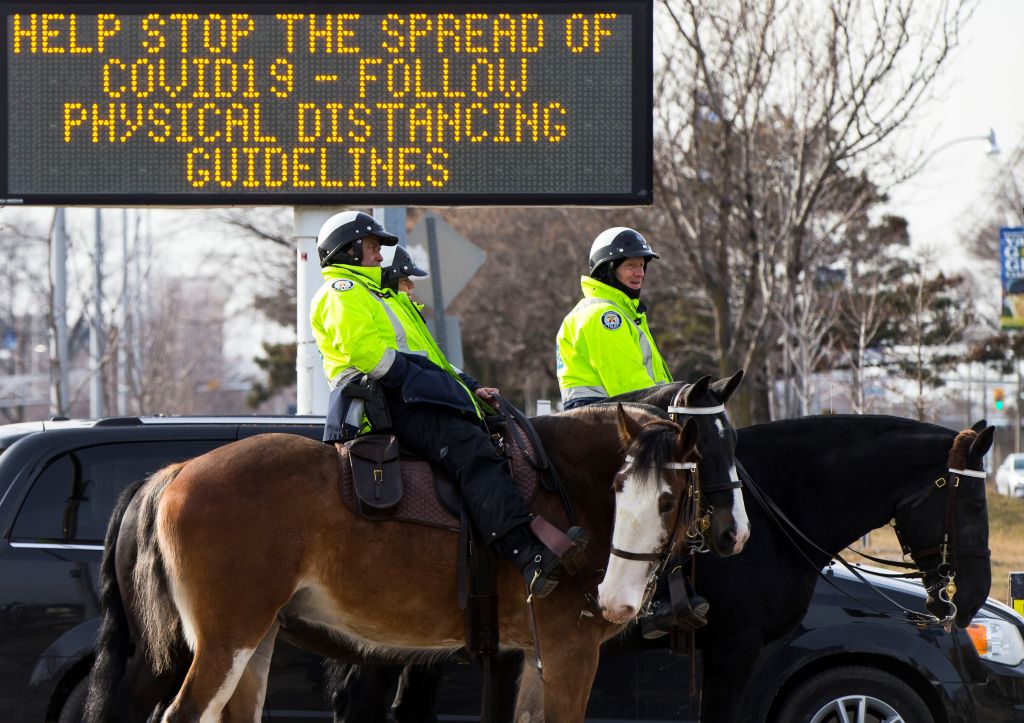
Toronto police are launching what it calls “dedicated enforcement teams” in each division to focus on large gatherings that choose to ignore the current COVID-19 related restrictions.
The units will respond to reports of large gatherings across the city that flout the stay-at-home order and Ontario’s gathering limits.
The maximum size allowed under provincial guidelines is five people that reside in the same household.
Staff superintendent Randy Carter is overseeing the enforcement action and says the divisional teams will focus on large gatherings including parties at short-term rentals or at bars and restaurants.
“Everyone must do their part to protect our health and safety, and for police that means continuing to enforce equitably and effectively,” he said.
Police chief James Ramer says officers will not be conducting random stops of people or cars.
Additionally, people are not compelled to explain why they are out of their residence, nor is being outside evidence of a failure to comply with the emergency order.
“We are at a critical stage of this pandemic. COVID-19 is now a matter of public health and public safety,” said Ramer.
“The Toronto Police Service will enforce the provincial orders and will work with the city’s bylaw officers and Toronto Public Health to enforce the measures that will help slow the rapid spread of COVID-19 that is putting public safety at risk.”
Ontario reversed course on sweeping new police powers Saturday, just one day after Premier Doug Ford announced the measures that triggered a swift and furious backlash.
The stay-at-home order allows people to leave their residence for essentials such as grocery shopping, going to the pharmacy, getting vaccinated, or exercising outdoors. This includes going to work if you can’t work from home.
Ramer says workers are not required to have proof from their employer that they are traveling to, or from their workplace.
“The Service will have a dedicated enforcement team in each Division across the city to respond to reports of large gatherings which jeopardize the health and safety of our community,” added Ramer.
“I again urge all Torontonians to please comply with the Stay-at-Home order. Let’s work together to stop the rapid growth in cases and relieve the pressure on our health care system.”
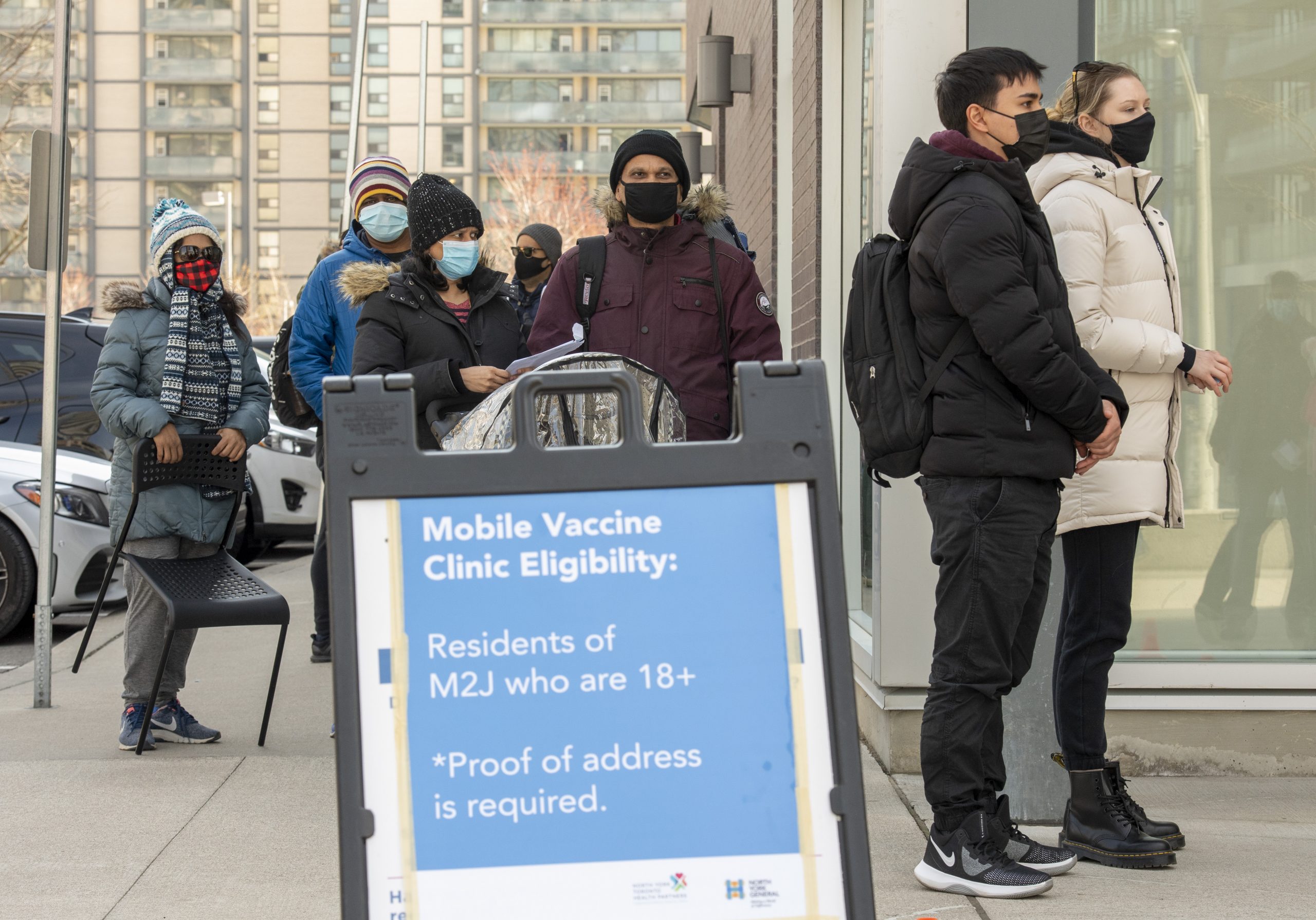
A new program, with the same goal as always: to win the race against COVID-19 and the variants.
The City of Toronto is ramping up its efforts to get more residents living in hotspot communities vaccinated at a quicker pace, introducing a new mobile vaccination strategy with an aim to triple the amount of vaccine in those neighbourhoods.
At today’s COVID-19 briefing, Toronto mayor John Tory and medical officer of health Dr. Eileen de Villa elaborated on a “sprint strategy” with Toronto health sector partners, confirming that Toronto expects to start regularly receiving larger shipments of vaccine from the province.
Tory says the goal is to ensure that this increased vaccine supply will be offered to eligible residents, especially those living in 13 specific hotspots, as quickly as possible through mobile and pop-up community vaccination clinics.
“We’re united in one goal: get vaccines to our most vulnerable, as quickly as possible. By working together to ramp up vaccinations in the 13 highest priority areas through mobile and pop-up clinics, we are working to protect Torontonians at greatest risk of COVID-19, including frontline and essential workers,” said the mayor.
“Right now, it’s all hands on deck to get vaccines out to our hardest-hit communities, and into Torontonians’ arms.”
Toronto Public Health identified these 13 priority areas classified by postal code to direct increased vaccine to through mobile and pop-up clinics:
- Northwest: M9W, M9V, M9L, M9M, M9N, M6M, M3K, M3J, M3N, M3M
- Central: M4H
- East: M1J, M1G
This will be conducted through a combination of mobile, and pop-up clinics, and the shots will be available for anyone at least 18 years old.
When those 13 areas are done, the city will move on to the next group of hotspot regions.
This past weekend TPH allocated 3,700 doses for these mobile and pop-up clinics. For following sprint strategy clinics, the plan is to allocate 12,000 doses a week.
The nine city-operated COVID-19 immunization clinics will continue to operate from 11 a.m. to 8 p.m. seven days per week.
“The teams from our Toronto Hospitals, primary care providers, and teams across the health system continue to inspire me as we work together on the mobile sprint strategy,” said de Villa.
“These clinics, held in communities through the leadership and wisdom of community leaders are inspiring and give me hope that Toronto can dampen the effect of this virus to the point that we can think about a future where we live with this virus and regain much of what we’ve lost to the pandemic.”
A new block of approximately 231,000 appointments in city-operated immunization clinics between May 10th and June 6th will soon be made available through the province’s online booking portal.
TPH also announced that clinic resources will be enhanced at multiple immunization centres, including Scarborough Town Centre (25 percent increase), the Malvern Community Recreation Centre (25 percent increase), and The Hangar Sport and Event Centre (25 percent increase).
De Villa repeats her warning that we can not vaccinate our way out of the third wave of the virus, saying it will take a combination of vaccinations and public health protective measures to flatten the curve.
“The more vaccine that comes, the harder the teams will work to bring this about.”
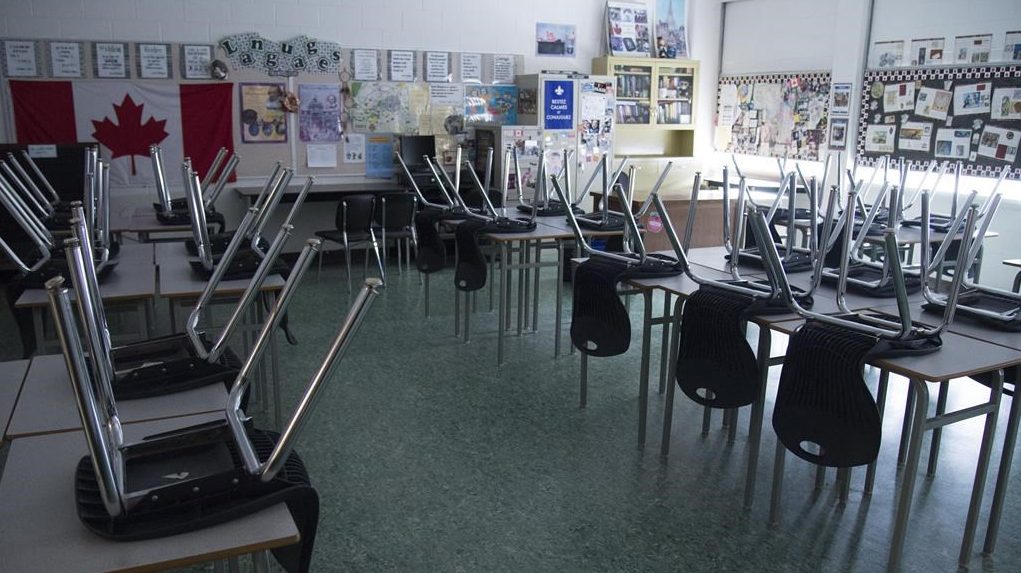
The Toronto Catholic District School Board elementary teachers have voted in favour of strike action as they are set to return to the bargaining table with the school board, two sources close to the situation tell CityNews.
In a screenshot of an email obtained by CityNews, the Toronto Elementary Catholic Teachers (TECT) union says teachers voted 90.8 per cent in favour of strike action d uring a meeting Tuesday evening.
uring a meeting Tuesday evening.
The two sides are set to return to the bargaining table on April 27. Neither the union or the school board would confirm the vote in favour of strike action to CityNews.
Union President Julie Altomare-DiNunzio said they were unable to comment “as we are still in the bargaining process which remains confidential at this time.”
Among the items being discussed in bargaining include eliminating a Friday PA day in lieu of teachers working parent-teacher interviews over two evenings.
Also:
- Infractions that teachers receive would need to be reported to the board within 48 hours, whether teachers are guilty or innocent. This includes violations of the Ontario Highway Traffic Act … such as speeding tickets.
- Currently if a teacher is absent for five days, they need a doctor’s note. The board wants to require a doctor’s note for a single-day absence.
- The school board also wants to restrict when union reps can join teachers in meetings with administration.
The TECT represents over 4,000 elementary Catholic school teachers who work in Toronto.
With files from Diana Pereira
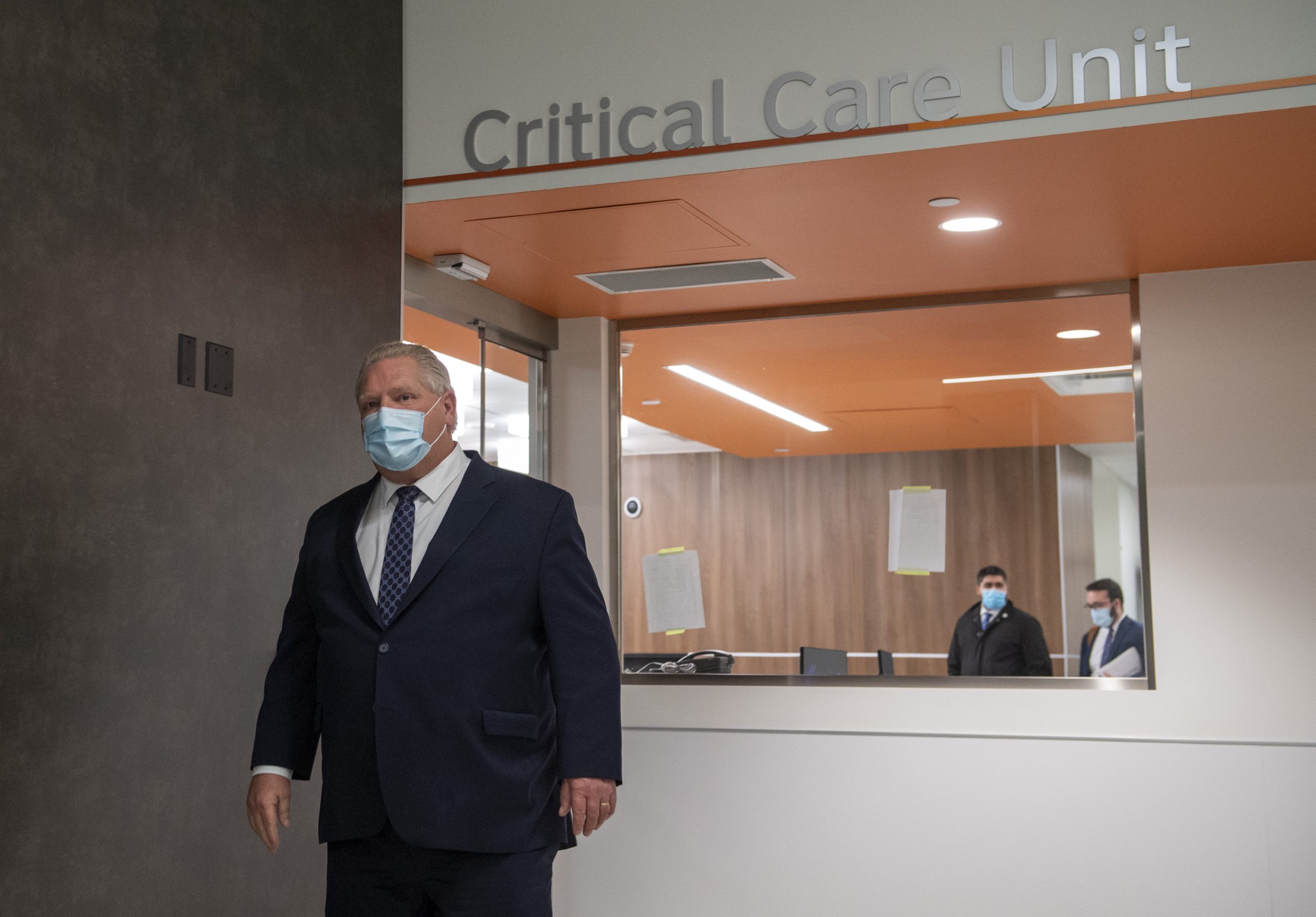
Doug Ford’s government will be announcing “additional enhancements” to paid sick days in the “very near future,” Ontario government house leader, Paul Calandra, said at Queen’s Park on Wednesday without providing further details.
WATCH: https://toronto.citynews.ca/2021/04/21/announcement-on-paid-sick-day-enhancements-coming-in-near-future-house-leader/
When asked by NDP Leader Andrea Horwath if the Ford government would bring paid sick days to Ontario, Calandra responded: “We were … disappointed that the federal budget did not include some of the enhancements that we asked for, that we were assured would be in that budget, and given that those enhancements that we have advocated for (weren’t included) we have been very clear that the government of Ontario would be coming forward with additional enhancements in the very near future.”
Sources tells CityNews an announcement on paid sick days is expected later this week or early next week, but the Ford government won’t be supporting the NDP motion on the matter, with Calandra calling it too “vague.”
Sources also say the Ford government is changing its internal process to avoid rushed decisions that lead to policy reversals.
Premier Ford, who is currently isolating after coming into close contact with a staffer who tested positive for COVID-19, is expected address the public in the near future.
Ford and Solicitor General Sylvia Jones both came under fire for new COVID-19 measures announced last Friday that gave police enhanced powers to stop and question citizens, as well as banning families from using playgrounds.
Both of those measures were reversed a day later after considerable backlash.





